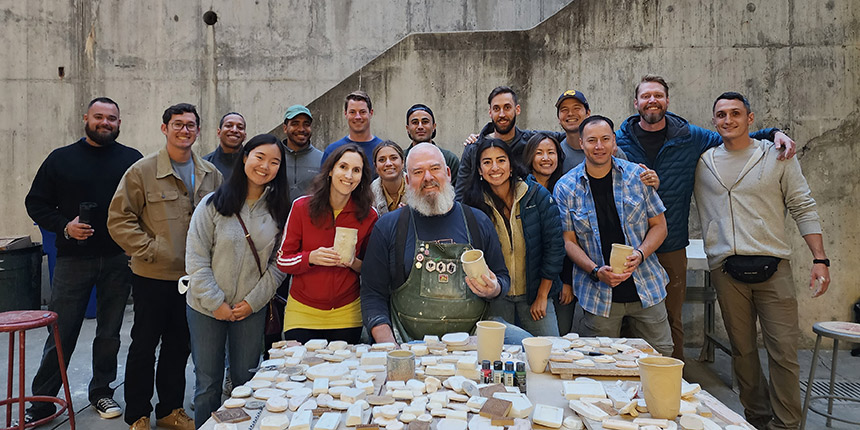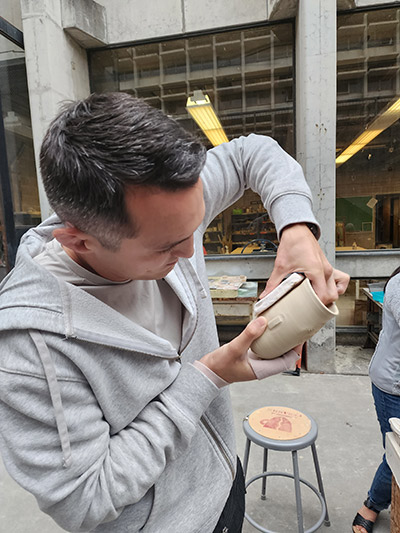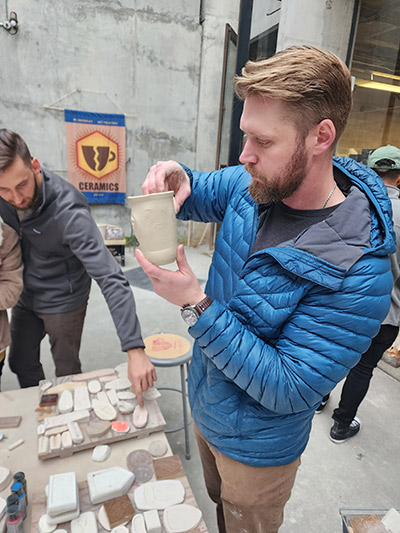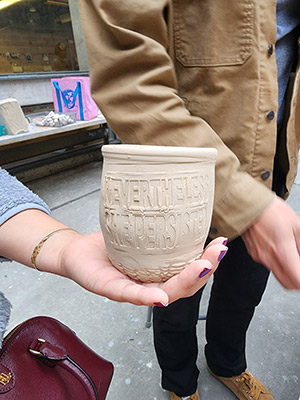
By Andrew Cohen
It sounds like the start of a joke: A man and his girlfriend walk into a bar and meet a guy who’s made more than 25,000 ceramic mugs…
But for members of two Berkeley Law student organizations for active military and veterans, Mark Mabry’s chance meeting with Ehren Tool at a local watering hole turned into a seriously gratifying and cathartic event.

A Marine Corps veteran of the 1991 Gulf War, Tool’s artistic talents have brought veterans together for more than two decades, helping them create and design mugs that connect with their military experience. The UC Berkeley Art Department’s senior laboratory mechanician for ceramics since 2005, his prolific work and generous outreach has been written about in various media outlets. Just weeks before they stumbled into Tool (not literally) at the bar, Mabry’s girlfriend had sent him one of those articles.
“We introduced ourselves and Ehren immediately offered to put on a ceramics event for the law school’s veterans,” says Mabry, a 2L who was a Marine Corps infantry officer from 2016 to 2020 and now co-leads Military Veterans of Berkeley Law (MVBL). “Eric Wright and the other group leaders liked the idea, so we reached out to Ehren this semester and set it up. He did a great job and everyone had a blast.”
Tool cultivated the recent gathering for members of MVBL and Legal Obstacles Veterans Encounter (LOVE), a Student-Initiated Legal Services Project created last year, and some alumni veterans.
“The transition to the civilian world can be hard,” says Tool, a 2010 United States Artist Fellowship recipient who has shown his work across the U.S. and Europe. “Everything you do in the military you do as a group. The civilian world can be very lonely. Connecting with other vets has been a real help for me. So many of the divisions in the civilian world do not matter among vets. We can share things with each other we may not be able to share with our families.
“When the vets get to pick images and insignia to put on their cups, the cups become a place to speak about unspeakable things. I just make cups. The vets, their families and their stories make the cups something more. The veteran community is diverse, and in these divisive times building community seems like our best chance at a brighter future.”
Connection and creation
Tool’s military background, artistic expertise, and welcoming personality resonated strongly with the students and alums.
“Ehren Tool is a part of the campus veterans community,” says Wright, a 2L who served as an Army engineer officer with two deployments to Afghanistan. “He has the lived experience to understand what younger veterans are going through and to provide perspective. It’s really important in law school to have a support network and to find community.”
MVBL works to create a haven where veterans can help one another succeed in law school and beyond. Its efforts include promoting social cohesion among veterans and military service members at the school, developing veteran-specific professional opportunities for members, and hosting events that educate the wider student body on military-related topics in the law.
The group welcomes non-veterans to join as well, including those with family ties or those interested in future military service, especially as a member of any of the services’ Judge Advocate General (JAG) corps.
LOVE provides pro bono assistance to disadvantaged veterans in need. That includes assisting elderly veterans seeking to obtain their earned benefits, and through monthly intake clinics where students support local attorneys who help veterans applying for discharge upgrades.

In a sign of how these basic issues of access to justice reach beyond the veteran community, over half of LOVE’s members this year are non-veterans, including some LL.M. students. The group also provides legal research support for the school’s Veterans Law Practicum, a two-unit class taught by lecturer Rose Carmen Goldberg
Gathering the groups’ members for a unique artistic experience proved freeing for many.
2L Eric Provost was instantly sold on the event idea after viewing some of Tool’s artwork and meeting him in person. A 2013 Naval Academy graduate who was selected for the Navy’s nuclear power training program, he served for eight years, including as a submarine weapons and tactics instructor.
“I wouldn’t deem anything I create even remotely artistic, but I did enjoy using the Navy insignia and other symbols that I felt characterized my service on my own mug rather than having someone else apply those labels to me,” Provost says. “My favorite part of the evening was getting the chance to socialize with everyone who came out. We really wanted anyone with an interest or connection to the military to join us — not just veterans — so it was great seeing new faces, hearing everyone’s stories, and seeing what they created.”
Reflecting a wide range
The mugs will be displayed Nov. 19 before the Cal-Stanford football game at the “Platform” tailgate (Platform is a UC Berkeley Art Department initiative featuring collaborative, participatory art projects and pop-up exhibitions).

Some reflect a sense of camaraderie, discipline, and commitment while serving. Some are more playful and others more solemn, in keeping with the diversity of the experiences and of the veterans themselves.
“In the Marine infantry it comes down to being more lethal than whoever you’re fighting against,” Mabry says. “So lethality is the goal when you’re training, when you’re planning, and when you’re executing… I think that is what I remember the most about my time in the Marines and that’s why my mug has a mixture of sarcasm, humor, weaponry, and violence.”
Marian Lee, a 3L invited by her boyfriend who served in the Army, welcomed the chance to meet other veterans and hear about their varied experiences.
“I wanted to support veterans and to get to know others in the community,” she says. “The thing I enjoyed most was seeing everyone’s mug. It was interesting to see what designs they chose and to learn why they picked those designs.”
A welcome conduit to connect with veterans, the event also provided a reminder of why they’re now part of the same law school.
“The culture of Berkeley Law is one of public service,” Wright says. “That really makes it a good fit for many veterans.”